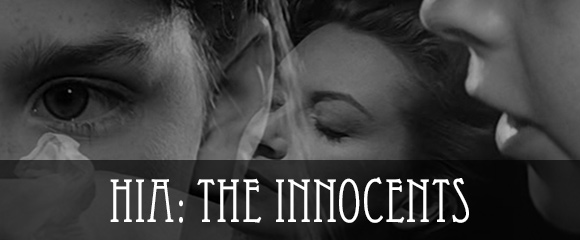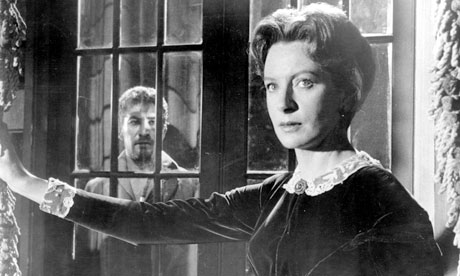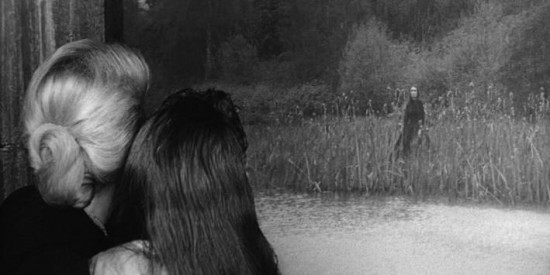Hell Is Adaptations: The Innocents

Only make the reader’s general vision of evil intense enough, I said to myself . . . and his own experience, his own imagination, his own sympathy (with the children) and horror (of their false friends) will supply him quite sufficiently with all the particulars. Make him think the evil, make him think it for himself, and you are released from weak specifications.
—Henry James, 1908 Preface to the New York Edition of The Turn of the Screw
In considering which genre film adaptations to take a look at for WWEnd’s new blog series, I thought I’d begin with that most unusual case—a successful film adaptation of one of my favorite novels; one that manages to respect the original story while using the tools of cinema to elucidate that story in ways not possible on the printed page. Instead of nitpicking the alterations from print to screen and wondering what in the world the filmmakers were thinking (which, unfortunately, tends to be my response to film adaptation of novels I admire, more often than not), upon re-watching The Innocents, the 1961 adaptation of Henry James’s The Turn of the Screw, I found myself admiring the ways in which the filmmakers had added their own touches to the story, indicating a real understanding of the essential ambiguity that defines The Turn of the Screw, while not merely giving the audience a slavish recreation of the original.
Henry James may seem the polar opposite of a genre writer, but he was not averse to the occasional ghost story—a form which well suited his literary attempts to reveal the complexity of human psychology and motivations. The Turn of the Screw (1898), however, is simultaneously one of the greatest of all ghost stories and possibly not a ghost story at all, and it is this ambiguity which makes the reader an active participant in the narrative. By pushing us into imagining evil, rather than spelling it out himself, James forces us to become complicit in it. In a literal reading, Miles and Flora—two children left at a country estate under the care of servants by a neglectful uncle upon the deaths of their parents—have been corrupted and quite likely sexually abused by two of the servants. Now the evil pair—Peter Quint and Miss Jessel, the former governess, both dead under unexplained circumstances—have returned as ghosts to continue their corruption of the innocent children. These events, however, are related in the first person by the new governess who has arrived to replace Miss Jessel. We never see the terrible happenings, and the children never admit to them, though the housekeeper did see things that lend credence to the possibility. Given what we learn about this governess, and the lack or corroboration, it is possible that she is projecting her own psychological fears onto the children, allowing hints, along with their admittedly odd behavior, to drive her toward a hysteria inflamed by her own sexual repression. The ghosts she witnesses may merely be manifestations of her own inner demons.

Director Jack Clayton’s 1961 film adaptation of James’s novel was derived from, and named after, William Archibald’s play The Innocents, which had premiered in 1950. Archibald co-wrote the screenplay—which won an Edgar Award from the Mystery Writers of America—with Truman Capote, who was credited by Archibald for most of what eventually made it to the screen. Capote, of course, was a well-known author by this time, while Clayton was fresh of the success of his first film, Room at the Top, which helped inaugurate the British New Wave of cinematic social realism. Freddie Francis, who had worked on Room at the Top and other prestigious British films of the period, provided the memorably atmospheric widescreen black and white cinematography. (He would soon become a director himself, working with Hammer and Amicus studios on numerous horror films.) With the level of talent involved, it is clear that 20th Century Fox was looking to take a chance on a “prestige” horror film that could bring a new level of respect to the genre. As the trailer’s tagline put it: “There has never been a ghost story created especially for the adult moviegoer until The Innocents.”
The Innocents is faithful to James’s original story, while making full use of the potential of film to provide cinematic touches that heighten certain aspects of that story. In The Turn of the Screw, it is made clear that Miss Jessel and Peter Quint had an affair, and both died under circumstances that are not made explicit. Also left unsaid is the specific influence of them and their affair on the children. The reader learns that the housekeeper, Mrs. Grose, thinks that the children knew of the affair, and that the lovers spent a lot of time alone with Miles and Flora. The new governess enters this scene after the deaths and, upon encountering the ghosts of Quint and Jessell, becomes convinced that they have returned to continue their “unnatural” relationship with the children. The possibility of sexual abuse inevitably arises in the reader’s mind (why else would the governess have such an extreme response?), but there is no actual evidence of it.
The film version makes certain things more explicit (beginning by naming James’s unnamed governess Miss Giddens, played wonderfully in the film by Deborah Kerr), increasing the psychological horror quotient while managing to maintain the underlying ambiguity of the original. An important aspect of James’s story is that none of the other characters admit to seeing the ghosts, leaving open the possibility that the governess is hallucinating. In the film, the camera (and, thus, the audience) sees the ghosts, and these images are bound to give extra credence to Miss Giddens’s interpretation of events. Yet, at the same time, the film undermines this possibility by calling into question the strongest piece of evidence for the governess’s credibility. In James’s version, the governess’s description of Quint’s ghost matches his actual appearance, which she would have had no other way of knowing. In The Innocents, Miss Giddens finds a photo of Quint in the attic just prior to seeing the ghost, raising the possibility that she is projecting that image onto her hallucination. The film’s script also takes the influence of the ghosts to another level, as Giddens reaches the conclusion that, not only were the children traumatized by witnessing the sexual exploits of Quint and Jessel (Giddens hears the ghost of Jessel say, “the children are watching”), but that they have actually come to be possessed by the two corruptors, leading to even more unpleasant possibilities in the mind of the audience. It could be objected that James never took things this far, but, while more specifically suggestive than the novel, the film never subverts the idea that the evil remains ultimately in the mind of the audience.

The filmmakers also find other ways of heightening the tension and terror in ways not possible in a novel. The use of soft focus helps lend a thickness to the atmosphere of the film—an effect that is further emphasized when Miss Giddens witnesses the ghosts, and in a disturbing dream sequence that illuminates the governess’s chaotic state of mind, whether due to her own psychology or the effects of the haunting. The weather also cooperates to emphasize that state of mind. Gusts of wind through the tree startle Miss Giddens (and the audience) when she reaches unpleasant realizations, or when the ghosts appear. Buzzing insects become louder on the soundtrack when she thinks about the children’s corruption, and corruption and decay are further emphasized by repeated images of the petals falling from roses at the slightest touch. This impression of “over-ripeness” becomes stronger as the film progresses, the weather reaches the height of summer, and Miss Giddens becomes more and more overwrought. The beautiful English country estate where the story is set seems to get hotter, the vegetation thicker and more unruly. As Miss Giddens’ conviction of the “unnatural” influence on the children grows, the power of nature becomes more prominent visually, and on the soundtrack. The climactic confrontation between Miss Giddens and Miles takes place in a hothouse, and the perspiration on the actors’ faces becomes increasingly visible as the scene progresses.
That final scene with Miles, along with an earlier one in which Miss Giddens confronts Flora, who runs screaming from the governess rather than confess to seeing Jessel’s ghost, brings the conflict, not just between Giddens and the children, but between differing interpretations of the film’s events, to a fever pitch. The governess thinks she must force the children to confront the demons in order to exorcise them and remove the evil influence. But what if the governess is right and the children have been corrupted or abused in some way? I was uncomfortably reminded in these scenes of the way children have been pushed into making false accusations of sexual abuse by overzealous courtroom interrogators. And if Miss Giddens’s suspicions are true, her response is still discomforting. The governess thinks her actions must be positive, taught by her minister father that we must always try to help others, even when they don’t want it. But in the startling final scene, we are forced to consider whether or not the cure is worse than the disease, and to question her real, probably subconscious, motives. (Freudians will have a lot to sink their teeth into here.) Even as the film ends, we still have no sure way to judge the characters’ actions, and questions remain to haunt us.
Whatever the “real” nature of the ghosts in the story, The Innocents is a great ghost story. Or it’s a fascinating and disturbing portrait of the effects of sexual repression. In the end, there is really no need to choose, and this ambiguity is crucial to the story’s tension and interest. Regardless of interpretation, The Innocents holds up as a classic psychological horror film, and as a superb adaptation of one of the cornerstones of fantastic fiction.
 Rent The Innocents from Amazon Instant Video
Rent The Innocents from Amazon Instant Video



















 Full Details
Full Details


No comments yet.
Sorry, the comment form is closed at this time.